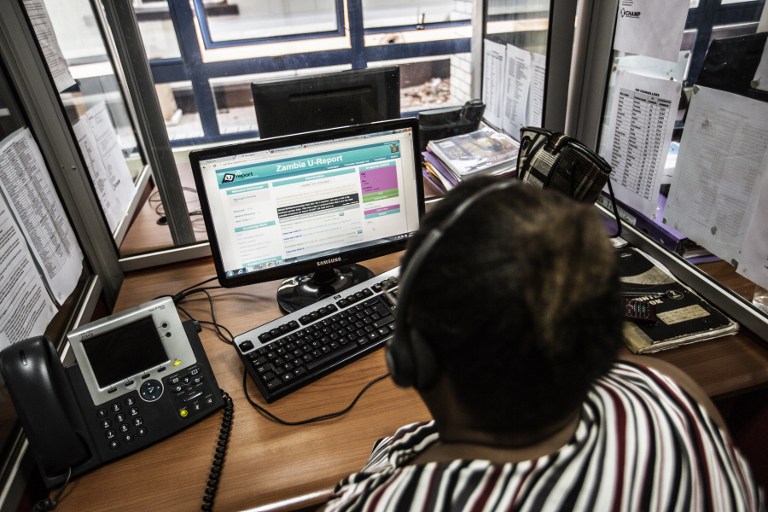by M&G 03.12.2014
A Zambian HIV counsellor looks at text messages coming up on the U-report platform for HIV and Aids awareness at a call centre in Lusaka. (Pic: AFP)
The questions teenagers ask about HIV are brutally honest, anonymous – and sent in 160 characters or less over mobile phone text messages.
At U-Report, a Zambian HIV advice organization, thousands of bite-sized questions come through every day.
One asks, “I have a girl who has HIV and now she is talking about marriage what can I do with her?”
Another wants to know “when you kiss someone deeply can it be possible to contract the virus?”
Though Aids-related deaths are significantly decreasing internationally, they continue to rise among adolescents, according to a UNICEF report released last week.
But services like U-Report are offering a new way to get through to teens too afraid or too embarrassed to talk to health care workers face-to-face.
Located in a nondescript office building in Lusaka, the counselors sit behind desktop computers answering SMS queries on everything from how the virus is spread, to the pros and cons of male circumcision.
Launched in 2012, the service now boasts over 70 000 subscribers and is being used as a model for other countries, including South Africa and Tanzania.
“We are receiving messages from all over Zambia,” said manager Christina Mutale. “It went viral.”
Significantly, a third of participants are teens, those most likely to die from Aids.
Sitting in a garden outside the Lusaka clinic where she receives her treatment, U-Report user Chilufya Mwanangumbi said counselors could be hard to find.
High infection rate
With purple-painted nails and dreams of being a civil engineer, the 19-year-old student is one of Zambia’s many teenagers living with HIV.
“At other clinics, they don’t tell you what to do, they just tell you you’re positive and send you home with the drugs,” said Mwanangumbi.
“That’s when people kill themselves – because they think it’s the end of the world.”
UNAIids, the UN agency battling the disease, estimates 2.1 million adolescents are living with HIV in 2013, 80 percent of them in sub-Saharan Africa.
Zambia has one of the highest HIV infection rates in the world – an estimated 13 percent of its 14 million people are infected.
Signs of the epidemic are everywhere.
In the Saturday Post newspaper nearly half of the classifieds section is filled with adverts for herbal cures for HIV and Aids, alongside remedies for wide hips and reclaiming lost lovers.
And while U-Report is starting to address the teenage HIV crisis, the barriers to success in the country are high. Even if teens get access to counseling, they may struggle to find a suitable clinic in Zambia, where there is a chronic shortage of doctors and health workers.
Medical services and technology
Yet there has never been a better time for a mobile phoned-based counseling service.
By the end of 2014, there will be more than 635 million mobile subscriptions in sub-Saharan Africa, a number set to grow as phones become cheaper and data more readily available, said Swedish technology company Ericsson in a recent report.
Zambia’s text message experiment is part of an international trend that is seeing medical services being provided via technology, with digitally savvy teens the quickest to adapt.
“The long-term findings on adolescents, health care and computer technologies is that they often prefer them to face-to-face communication,” said Kevin Patrick, director at the Center for Wireless and Population Health Systems at the University of California, San Diego.
“They will more likely confide in a computer about sensitive issues.”
And as Zambia wrestles to shore up its overwhelmed health care system, inexpensive mobile technology could help ease the strain.
“Apps exist to help people locate the closest HIV testing site,” said David Moore, a professor at the University of California, San Diego, researching mobile technologies and HIV. “What if you could do something like an HIV rapid test using an app on your phone? That could be a game changer in terms of HIV incidence.”

